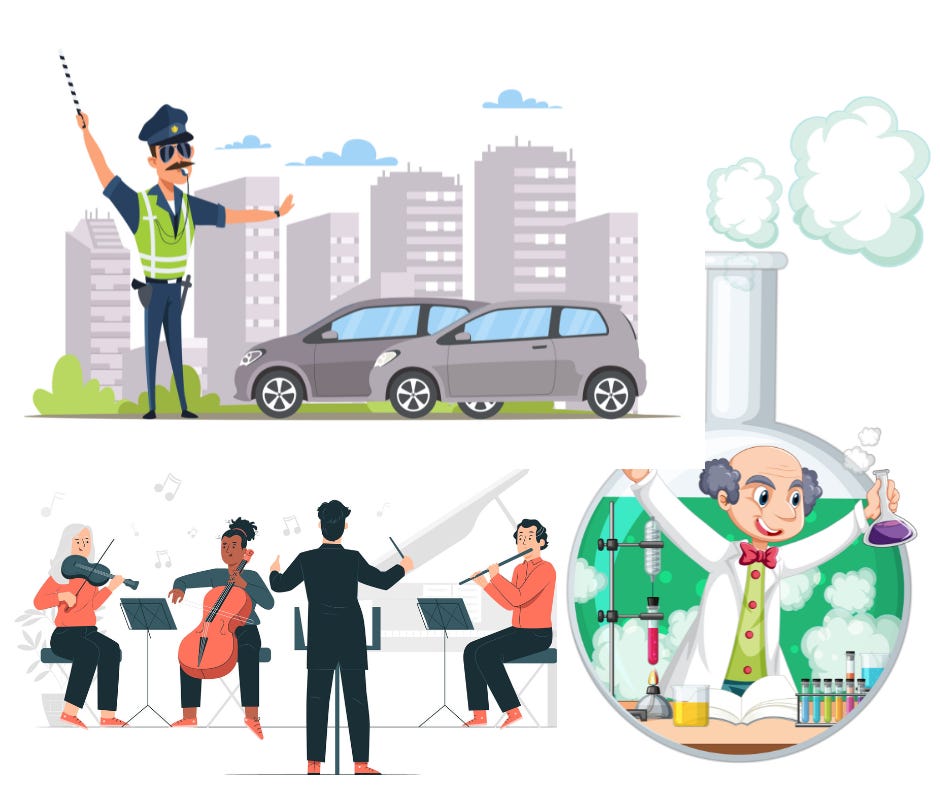#08 Are You a Traffic Policeman?
What is your role? Policeman, Symphony Conductor or Catalyst in a chemical reaction? Let's look at all these roles from the POV of an inspirational trainer.
As part of an exercise on facilitation skills, I came across this interesting set of analogies which I am sharing here. To what other roles can we compare a facilitator’s behaviour in the learning space? These are three of the answers that lend themselves to interpretation - the Policeman, the Catalyst, the Orchestra Conductor (and one more, but that’s a secret recipe at the end).
The Facilitator as a Traffic Policeman
Unlike the teacher who controls the flow of information from Text Book via Teacher to Students — a very typical scenario — the facilitator plays the role of a traffic policeman. Keeping the flow of communications free and quick while controlling the “overflow” and blowing the whistle on traffic violations. The facilitator lays down some traffic rules, one way streets, no parking or speeding, for the exercises given in the room while encouraging, coaxing and calling for involvement from slow moving vehicles, and even stopped vehicles. Controlling road rage is comparable to managing classroom conflict, too. So, that’s one role that a facilitator plays but I would hate to be a policeman in the classroom, controlling, directing and punishing.
The Facilitator as a Chemical Catalyst
All the Chemistry enthusiasts are going to love this one. A catalyst is a participant in a chemical reaction that facilitates change but does not undergo any change itself. There, the definition out of the way, what does it mean for a facilitator? I was once told that if you see a trainer crawling out of a classroom while the learners are happy and full of life, then he or she is not very good at the job. In another analogy, in a scout camp, if all the work of cooking and cleaning is going on, but the Scoutmaster is asleep in an armchair, then he is probably the best Scoutmaster available. So, similar to this, in the classroom, the facilitator causes ‘chemical reactions’ — emotional, mental, physical, even spiritual — without undergoing any change him/herself. He/she accelerates the learning while remaining unaffected. As you would have guessed, this is an interesting theory which I do not completely buy. I think a facilitator undergoes change every time a learning situation occurs. They get better at their jobs. Also, in chemistry there is ‘spontaneous combustion’ which does not require a catalyst — let that sink in, spontaneity.
The Facilitator as an Orchestra Conductor
Imagine attending an orchestra recital. A large number of excellent musicians, each on a single instrument, face the conductor who raises his baton and the music follows every flip, beat, cue, phrase or rise and fall as the conductor interprets. Somewhat like the policeman, the conductor can point to individual groups of instruments to play on cue. So, here’s a person who does not play a single instrument himself but can get a hundred instruments playing by just waving his arms. The analogy, fitted to the facilitator, could mean that he gets everyone to create a beautiful symphony in the classroom while doing nothing himself, other than directing. I have a problem with this — the scope for interpretation is left to one person. Each musician or learner can only contribute according to their role or instrument. To me this facilitates getting things done, but not creative thinking! I am reminded of that hilarious video of Mr Bean finding himself accidentally in the conductor’s role, till he is bothered by a fly - which results in some exciting new music. The stark contrast there was the only creativity on display was Mr Bean’s actions — the rest of the musicians followed blindly, which is not facilitation in my book.
It’s not my book!
It’s a book that was presented to me in 2003, first published in 1998. The book is The Inspirational Trainer by Paul Z Jackson. It’s subtitled “Making your training flexible, spontaneous and creative”. Not strange that those are some of the features identified as missing from the analogies above. He uses performing arts as his framework for exposing many of his ideas. In particular, as a wannabe musician, I find his connection of training and facilitation with jazz performances very enlightening. There is a rhythm and a structure in Jazz which every musician onstage knows; within this the individual musicians experiment, create, improvise and deliver. When one musician steps up front for a solo, the others support and provide the base on which the improvisation is built - no one knows where that solo is going, but everyone knows that they need to support that person with a solid framework. And long before that, during rehearsals, the roles and rules are laid down and agreed so that the performance has a similar effect to the well-oiled orchestra, the smooth moving traffic and the explosive nature of a chemical reaction.
Have I facilitated a different way of thinking about training?


